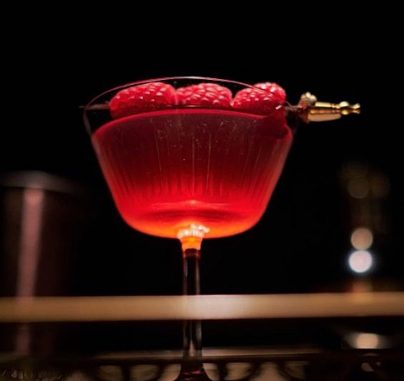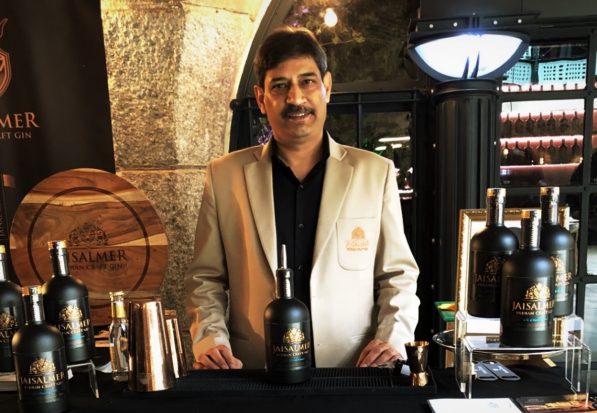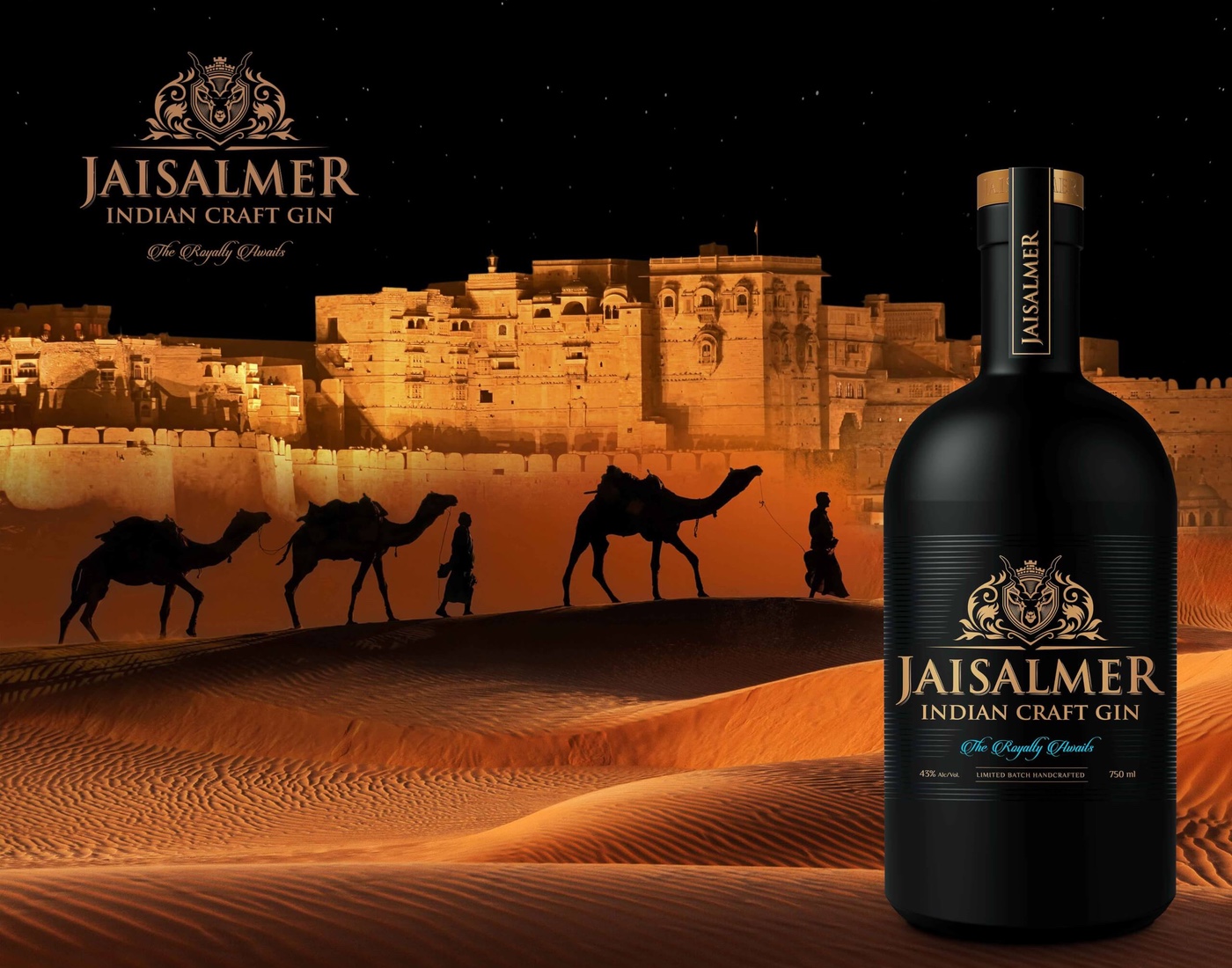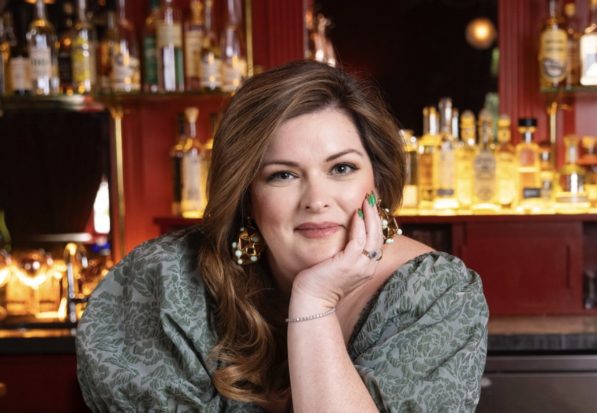Although you might think of gin as being very English, the Indian subcontinent’s influence on the spirit and how it is drunk has been substantial.
From the botanicals commonly used in its production to its most popular drink, the gin and tonic, the influence of India can easily be seen. Yet it is only recently that India has produced its own interpretation of the spirit and really added its voice to the gin conversation.
One of the brands that have been leading the way is Jaisalmer, which is a luxury gin made in Northern India that showcases the flavours of its home.
To find out more, we talked to Mr Sanjeev Banga, President of International Business at the gins’ parent company, Radico Khaitan about the growth of gin in India, what makes a distinctively Indian gin and what cocktails enhanced their gin.
For more information, go to jaisalmergin.com or connect with the brand on Instagram
Interviewer:
Although you might think of gin as being very English, the Indian subcontinent's influence on the spirit and how it is drunk has been substantial. From the botanicals commonly used in its production to its most popular drink, the gin and tonic, the influence of India can easily be seen. Yet it is only recently that India has produced its own interpretation of the spirit and really added its voice to the gin conversation. One of the brands that has been leading the way is Jaisalmer, which is a luxury gin made in Northern India that showcases the flavors of its home. To find out more, we talked to Mr. Sanjeev Banga, President of International Business at the gins' parent company, Radico Khaitan about the growth of gin in India, what makes a distinctively Indian gin and what cocktails enhanced their gin.
Thank you for joining us Sanjeev.
Sanjeev:
Thank you very much.
Interviewer:
Although the gin and tonic was born in India, Indians have historically had much more of an affiliation for whiskey. When do you think all of that changed?
Sanjeev:
Yeah, you're absolutely right. India has been predominantly a Brown spirit market. Of that, whiskey would account for about 60 to 64% and gin was, or for that matter, even white spirits, were a very, very niche category, very small category in India. But then we've seen the change happening in the last couple of years because Indians love to travel. They love to keep abreast with what's happening all around the world. So with the ginaseur happening in Europe, the Indians also took up to gin very fast. And today it's a very well-accepted category of drink in the Indian beverage alcohol space.
Interviewer:
Yeah, I believe that India is actually now the fifth largest gin market in the world. Why particularly, do you think that it has grown so much in popularity?
Sanjeev:
Honestly, yes. It may be the fifth-largest in terms of the gin consumption, but the earlier gins were essentially flavored spirit. There was no authenticity in the gin over there. The authentic gins, actually emerged 2018 onwards. In fact, for us, when we launched our Indian single malt Rampur in 2016, so 2016/17 when we were introducing our single malt in the European market. We saw a lot of interest in the gin category and it was growing, it was galloping in fact, and that's when we got thinking and we discovered gin and tonic actually originated in India, so we don't have an authentic Indian gin. You had a lot of gins with an Indian name or Indian sounding name, like say Bombay, Sapphire, Jodhpur, or old Raj, but there wasn't an authentic gin from India till then. And that's when we thought of doing a craft Indian gin and luckily around the same time, couple of other distillers in India, also thought of getting into the gin because that was what was the spirit or the beverage of the moment. And luckily couple of us got together in the gin category, and now the gin category is, you can say, exploding in India as well, apart from the rest of the world.
Interviewer:
Now, the gin that you mentioned, you actually named after the Northern city of Jaisalmer. Why was that?
Sanjeev:
Well, you know, Jaisalmer is a princely state in the Northern part of India in the state of Rajasthan. It's a historic city and often described as a jewel in India's crown. It's seeped in history, it's got the renowned golden fort, in fact, it's a UNESCO world heritage site as well. It's constructed by sand stones and appears golden at sunset. So it is marvelous. It's so beautiful. In fact, the whole city of Jaisalmer bursts with color, festival, Royal tradition, and richness. And that's what we wanted our Indian craft gin to represent. And that's the reason we named it Jaisalmer. It's also ... one of the key botanicals that we use in Jaisalmer is coriander and that is grown in the farms in and around Jaisalmer. So that's the reason we decided to have the royalty, and then the of one of the key botanical and the whole experience of freshness and vibrancy
Interviewer:
Now, while it may be named after the city, it's not actually distilled there is it?
Sanjeev:
No, it's not. It's distilled at our mother distillery in Rampur, which is in Uttar Pradesh, which is the foothills of Himalayas, because that's ... we are in fact, one of the largest distillers of spirit in whole of Asia, we do about 13 million litres of spirit every month. So that that's where our mother plant is located, where our single malt distillery is also located, and that's where we set up the gin distillery as well.
Interviewer:
Was there much of a process to set the gin distillery up?
Sanjeev:
Well, we've got ... everything's there, it's a huge campus that we have, as I said, we do a lot of alcohol production over there. So the key essential, if you look at the gin, the key elements of that are the neutral, extra neutral grain spirit and the botanicals that you do in the distillation. We already produced the triple distilled grains, a neutral spirit over there. So all that we needed to do was to add the gin pot still and go the distillation over there. And we'll have a craft gin ready.
Interviewer:
You mentioned that the city of Jaisalmer had an association with India's Imperial age with maharajas and the Maharani and their leisure moments. Can you explain a little bit further about why that was an important representation to use?
Sanjeev:
Obviously, if you go back to that era, it was a far more leisurely era and traditions and relaxations as well. And all of Rajasthan, and especially Jaisalmer they had polo, horse polo, equestrian polo is a very popular sport over there. So you would have these lazy afternoons during a polo match that royalties sitting and sipping on a refreshing drink. And that's what made us imbibe that same freshness, the relaxation that you would experience if you taste Jaisalmer Gin.
Interviewer:
Now talk to us a little bit about the black buck and the very elegant black packaging that you've used for the gin.
Sanjeev:
Well Black Buck is the state animal of Jaisalmer and it's part of their Royal flag as well. So we've taken the black buck from that Royal flag. And if you really see between the horns, we have the outline of the golden fort, between the two horns, you have the outline of the Fort as well. So it's, it's something that we wanted to connect, not only the Fort and royalty, but also the proud state animal as well. And that the whole thing in the motive came out so nice.
Interviewer:
It's a beautiful bottle that you've used. Why did you choose to run with a black bottle rather than a clear bottle just with labelling?
Sanjeev:
Well, the bottle is a frosted black bottle with touches of raised gold on the label that reflects the Royal heritage and the golden colour of the Jaisalmer fort. The gold also represents the desert sand as well over there. So the whole thing, the whole experience of bringing that royalty, that moment to a consumer, and when you open the bottle and you get a refreshing drink out of that.
Interviewer:
Now let's talk about the gin itself, of the 11 botanicals that you've included, seven of those are native to India. Can you talk us through each of them and why they were included?
Sanjeev:
I had a lot of discussion with my master blender when we were working on the blend for our Jeisalmer Gin. If you see worldwide bottles happening as not many people were going overboard on botanicals. So today you have some gins, which talk of about 200, 250 botanicals as well. And when we were talking to our consumers and the trade partners, we realized that in a rush to add more botanicals, the gin was actually losing its soul. So we wanted to retain the soul of gin, which is Juniper berries, but then add some Indian-ness to that, add some freshness to that. And that's the reason we zeroed in only 11 botanicals. And then as I mentioned in India, the herbs and the knowledge of herbs has been age-old tradition. So we wanted to utilize that knowledge into the Jaisalmer blend.
And we chose seven botanicals all around from all four corners of India. Now of these seven, as I mentioned, coriander, one of the key botanical is from Jaisalmer itself. There is Vetiver also, which is a complex spice with intriguing peppery notes. So this has also grown around the fields in Jaisalmer, then we have the sweet orange peel from central India from a place called Nagpur, which is very famous for the oranges, which compliments the citrus and flavoured floral tones of the gin. We get Cubeb pepper from Southern India, Darjeeling green tea leaves from the Eastern part of India, lemon peel from Western India and also lemongrass from Southern India. So these are the seven botanicals that we use in our gin. And the four other botanicals that we use are the Angelica root liquorice, caraway seed, and of course Juniper berries that we get from Tuscany. So all together, this is an absolutely refreshing gin, retaining the soul of gin and what we call it is like an oasis in the desert and fit for royalty.
Interviewer:
It sounds as if the ingredients would produce a gin that is both citrus, but also with a little bit of spice, is that an accurate description of the flavour profile?
Sanjeev:
Absolutely. It's citrus refreshing and with an Indian-ness in the spicy note
Interviewer:
Now coriander is one of the major ingredients of a majority of gins that are made, and there are other botanicals that you've mentioned. Do you think people realize that so many of the botanicals they are used to are of in Indian Providence?
Sanjeev:
Well you know, apart from the botanicals, a lot of people were not even aware of gin and tonic the history behind it and how quinine played a very important role in the evolution of Indian tonic water. So it's, it's been in a very informative and educated journey for everyone involved, both from the brand-owner side of view and even the consumers. So people really appreciate the whole history behind it. And they, when we talk about the botanicals and then these have been traditionally there for generations together in India and India, in any case, is known more for the spices as well. So people love the whole story and then the actual proof lies in sipping the gin. And thankfully everyone's fallen in love with the gin.
Interviewer:
In case people don't know the history of gin and tonic, do you want to go into a little bit of detail about that?
Sanjeev:
Sure, sure. Well, the British had colonized India for a very, very long time, 150 years or so. And when the British army was based over here, they were fighting malaria thanks to the mosquitoes. And one of the medicine to fight malaria was quinine. Quinine is extracted from fever tree, from the oil of fever tree. And that's where you make quinine. but quinine Is extremely bitter to have on its own. So what was happening is the Brits being Brits, they added some soda into it, sugar syrup into it, lime juice and the quinine. So the whole tonic water came on the scene and then they were getting the gin from England for the army. So it was killing two birds at the same time. So they wanted to have their gin and they added the tonic water to it. And that's how gin and tonic actually came into existence. So you were having your spirit as well, enjoying your moment, but also having the medicine. So that's how gin and tonic started. And even today it is one of the most favourite cocktail in the world.
Interviewer:
So it would probably be the main cocktail that people know gin for really. Now getting back to your gin, I believe that you distill three times. Why is that?
Sanjeev:
Actually, we use a triple distilled grain, neutral spirit. That's the purest form of grain spirit. And then we infuse the botanicals in the spirit for about 24 to 36 hours and then distil the gin.
Interviewer:
And you're using a jacketed pot still. What made you choose that?
Sanjeev:
Well, that there's, there's copper still. And then there's a stainless pot still as well. And there are two layers into that, between that there is a hollow area and we pass steam through that. And the distillate is heated through that. It's a very slow process. It's since it's a craft operation, we do only 500 each batch, only 500 litres. And it's a very slow steam that passes through that. And then the vapours are formed and condensed. And then the gin is collected
Interviewer:
Right Now if someone were to buy a bottle, how would you want them to first experience it?
Sanjeev:
I'd love to them to try straight up, straight up and then add maybe a cube of ice into that, because that's when you get the real aroma, the real flavours of the gin. And then you can add an Indian tonic water to that, not a flavoured tonic or just a plain Indian tonic water.
Interviewer:
Other than a plain Indian tonic water, what other flavours do you think work well with the gin?
Sanjeev:
Frankly, everything The good thing these days is even the consumers love to experiment. So you, you may have a Negroni. You may have X, Y, Z, sort of cocktails and all that, but you are free. And especially in all these, thanks to the pandemic, do it yourself cocktails, people love to experiment. And the whole purpose of a spirit is we want the consumer to have a good time, a great time. So drink whatever pleases you, whatever makes you happy. Yes, we have on our website, on our social media, we do a lot of cocktails, we've posted a lot of cocktails as well, and we suggest to our followers, please post your own cocktails as well. And we come up with newer concoctions all the time. So we are absolutely open, please drink it the way you like it.
Interviewer:
I imagine though, with the citrus and the, and the spice, savoury ingredients and added citrus ingredients would work really well.
Sanjeev:
You know, as I mentioned, we've, we've tried to retain the soul of the gin, which is the Juniper berries comes out, but that for the Indian-ness and the, the botanicals, the Indian botanicals that have that we using lend themselves very well with any sort of cocktail concoction that you may like to do.
Interviewer:
And speaking of cocktails, I mean, aside from the obvious G&T, what other cocktails do you feel work particularly well?
Sanjeev:
Negroni works very well with that. Mojito again, my personal favourite after gin and tonic is a Jeisalmer Negroni.
Interviewer:
Okay. Yes. I imagine the spices would work very well with the Negroni.
Sanjeev:
Yeah.
Interviewer:
What is the reaction to the gin been, both in India and abroad?
Sanjeev:
Jaisalmer currently is available in about 30 countries including global travel retail. And it was doing exceedingly well, very well accepted in the travel retail, as well as all the market, but with the pandemic and lockdown of the on-trade, the spread has stunted a little bit in the bars and the cocktail circuit by what it has done is online sales have done exceedingly well, people have had time to experiment with the gin at home. And as I mentioned, a lot of them have tried different cocktails in their own bars in their own homes and they've loved the gin. In terms of awards, we've been consistently winning awards in the last three years. The gin guide has rated as the best gin in Asia, the ultimate spirit challenge gave it 95 points and rated it amongst the top hundred spirits of 2020. So we, the acceptance level has been phenomenal, even in India, we launched it in India only in December of 2020 has been very, very positive.
Interviewer:
How has the pandemic affected sales of the gin? Have you found that a lot more people are taking it up for home use?
Sanjeev:
A lot of, of course they are. Uh, but if you really look at it as, as a category, Gin, as a category was far more popular in the on-trade, in the bars, in the cocktail bars as well, but that got impacted because of the lockdowns and even travel retail. But then we, we now seen most of the on-trade opening up and we would see more of traction happening, but while we on trade or there was a lockdown, so people were ordering online as well. So we pretty happy with, for a new brand, you know, when you go to a store, you actually see and decide, but on an online for a new brand to get that kind of attraction is a big positive,
Interviewer:
Very much. So since starting with the brand, what changes have you seen in the gin industry and where do you think it's going to go in the future?
Sanjeev:
It's still early days. Europe, yes, there's been a ginaseur that's been happening. And before the pandemic, almost every week or fortnight, a new gin was coming on the scene as well. That's obviously slowed down because of the pandemic, but I don't think gin is going away anywhere. Even if you go back in history, gin was the original cocktail favourite of all the bartenders, and then Vodka came on the scene. Vodka is essentially beverage alcohol, which does not have any flavour, any taste. It's the purest form of alcohol, whereas gin has its own flavour. So that further enhances the cocktail. So I don't think gin as a category is going away anywhere, it's here to stay and you will see more and more innovations coming in the gin category, apart from just the colour, the pink gin. Now there'll be more and more. And in terms of a flavour profile, there's so much that you can do with adding those botanicals that you want to retain the soul of gin, but then add a different twist to it as well.
Interviewer:
Now you mentioned that you ask people to tell you what they, what they are creating with the gins. Has there been any cocktails that people have made that have really surprised you?
Sanjeev:
Yes and no. We, I have tried a few of the suggestions that they send and some of them just blew me off. Wow, this is fantastic. But then I'm sure some bar somewhere in the world would already be doing something like that. But then it is the consumer feedback. And that's what brings in the emotional bond with the brand as well. People are willing to experiment, try something new and then shared it with the rest of the world that this is what we did and this tested phenomenally well. So that gives us a lot of satisfaction.
Interviewer:
What do you want people to take away from their experience with Jaisalmer?
Sanjeev:
A truly refreshing gin, made to enjoy the moment that you are in, and it's something that you would like to keep sipping on and enjoy the moment amongst your friends, family, or wherever you are. So it's, as I said earlier, it's like an Oasis in the desert. So enjoy the moment.
Interviewer:
Now, you mentioned that you released the gin in India at the end of last year. Is that now available all across India?
Sanjeev:
No, not at the moment. Uh, thanks to the pandemic. The rollout has been slow, but it is available in all the major Metro cities be it Delhi, Mumbai, Goa, Bangalore, Hyderabad, Lucknow and all, and then slowly we are expanding, we are planning to roll it out by end of this year. Hopefully it will be available in all the key markets.
Interviewer:
And what about globally? You mentioned that it was available in 30 countries, whereabouts?
Sanjeev:
The whole of Europe, EU, it's available? USA, even in New Zealand, it's just getting into Australia as well. Singapore, Hong Kong, middle East, a couple of African markets as well. So, it's there. And since we haven't traveled in the last 14 months and we are keen to expand to the other markets as well, because all our other brands, our brands are currently available in 85 countries and all our distributors, our partners in those markets are looking for Jaisalmer as well. So we need to just work out the logistics and it it's going to ... the rollout has been slow because of the pandemic, but then soon it will be available in over 60 or 70 countries.
Interviewer:
So I suppose for the foreseeable future, the plans for Jaisalmer basically just to increase the distribution,
Sanjeev:
Just to increase the distribution and something we already have ready on the board got delayed because of the travel restrictions, we are planning to launch a special edition for the travel retail.
Interviewer:
Okay. And how will that be different?
Sanjeev:
Oh, it is, it's got something, a unique, one of another unique Indian botanical in it.
Interviewer:
Okay. So it will be different, slightly different in flavour from the original
Sanjeev:
Yes. Slightly different from the Jeisalmer Indian craft gin. So exclusively for travel retail, I'm just waiting for airports to open up and flights to start.
Interviewer:
Yes. I suppose they haven't given you much indication as to when that's going to happen.
Sanjeev:
Well, we are all hopeful in the next three to four months, things should start improving.
Interviewer:
All right, well, if people want more information about Jaisalmer, they can, of course, go to your website, which is www.jaisalmergin.com or connect with the brand via your socials.
Sanjeev:
Yeah, our Insta handle is @jaisalmergin.
Interviewer (29:06):
All right, Sanjeev, look, thank you so much for taking the time to speak with us.
Sanjeev:
Thank you very much, Tim. Pleasure talking to you.









